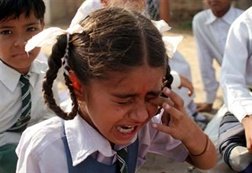School Phobia
School Phobia / School Refusal
School refusal is a situation in which a child will not go to school or frequently experiences severe distress related to school attendance.
A common cause of school refusal, especially in very young children, is separation anxiety. Separation anxiety is part of child development and occurs when the child is separated from the mother or primary caregiver. During the first 8 months of life the infant has little knowledge of what is ordinary and what may be dangerous. New situations or experiences seem usual and are not frightening and the infant becomes familiar with the home environment, and feels comfortable when parents or other known caretakers are present. After the first year the infant recognizes changed circumstances and becomes frightened or anxious when it meets new people or visits new places. It recognizes parents as familiar and safe and feels threatened and unsafe when separated from parents. Most children less than 2 years old will experience some degree of separation anxiety when in unfamiliar situations, especially when separated from their parents. After the age of 2 years the toddler begins to understand that parents may be absent for a short period of time but will return later.
Click here for tips to handle separation anxiety and prevent School phobia.
However, separation anxiety may return during periods of stress in older children such as:
- Illness in a parent
- Marital disharmony or frequent quarrels or arguments between parents or caregivers,
- Death in the family
- Death of a friend
- Shifting house
- Jealousy over a new brother or sister
- Parents who are over protective or worry about the child or fuss over the child when sick.
Separation anxiety in older children may result in school refusal. In addition problems at school can cause school refusal such as:
- feeling lost (especially in a new school),
- not having friends,
- being bullied by another child,
- not getting along with a teacher or classmates
- Learning disability
- difficulty in adjusting to rules, regulations, and disciplining by teacher
- harsh conditions in school
- anxiety or fear of tests, presentations, group work, specific lessons, or interaction with other children.
- students sent to boarding school may experience symptoms of physical illness caused by abrupt separation from family
School refusal may also occur due to depression in the child.

Symptoms:
Symptoms of school refusal include:
- Significant school absence (generally 1 week or more)
- significant distress even with school attendance.
- Crying or protesting every morning before school
- Missing the bus frequently or regularly
- Some type of physical symptom developing when it is time to go to school
Treatment:
The goal of treatment is to identify factors that are resulting in the school refusal, and managing them in order to help the child to a rapid return to school.
Medication may help to reduce anxiety and distress and facilitate counseling of the child.
Counseling of the child helps restructure thoughts and actions into a more assertive and adaptive framework to allow a rapid return to school.
Parental counseling helps parents understand what is happening, and to reduce THEIR anxiety and correct unhealthy parenting.
